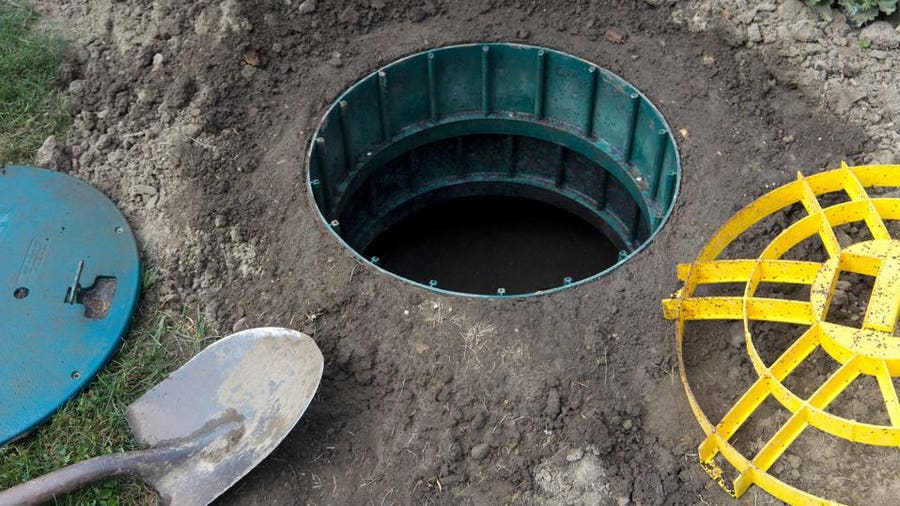If you’re a homeowner with a septic tank, you may be wondering how long this vital component of your household will last. A septic tank is designed to efficiently treat and dispose of wastewater, but its lifespan can vary depending on various factors. In this article, we will explore the average lifespan of a septic tank, the factors that can affect its durability, and tips to extend its longevity. So, if you’re curious about the longevity of your septic tank and want to ensure its optimal performance, keep reading!

Factors Affecting Septic Tank Lifespan
When it comes to the lifespan of your septic tank, several factors can influence how long it will last. Understanding these factors and taking appropriate measures can significantly extend the life of your septic system. Let’s take a closer look at these factors:
Maintenance
Regular maintenance is key to ensuring the longevity of your septic tank. Regular inspections should be conducted by a professional to identify any potential issues before they escalate into costly repairs or replacements. Pumping the septic tank on a regular basis is also crucial to prevent solids from accumulating and clogging the system. By adhering to a maintenance schedule and promptly addressing any problems, you can greatly enhance the lifespan of your septic tank.
Tank Material
The material of your septic tank plays a vital role in determining its lifespan. Generally, concrete or steel tanks are more durable and have a longer lifespan compared to fiberglass or polyethylene tanks. Concrete and steel tanks can withstand the test of time and are less prone to cracks or leaks. However, proper maintenance and regular inspections are still essential to ensure their longevity.
Tank Size
The size of your septic tank is another important factor to consider. A septic tank that is too small for your household’s needs may become overwhelmed by excessive wastewater, leading to premature wear and tear. On the other hand, a larger tank that is underutilized may lead to the accumulation of solids and waste that can cause blockages. Therefore, it is crucial to choose a septic tank size that is appropriate for your household’s water usage to enhance its lifespan.
Soil Type
The type of soil in your area can affect the lifespan of your septic tank. Soil acts as a natural filter for wastewater, allowing it to percolate and distribute evenly. If the soil in your area is heavy clay or has a high water table, it may impede the proper drainage of wastewater, leading to clogs and backups. In such cases, alternative systems or additional measures may be required to ensure the optimum functioning and increased lifespan of your septic tank.
Water Usage
Excessive water usage can put a strain on your septic tank, leading to reduced efficiency and a shorter lifespan. Conserving water by fixing leaks, using water-saving fixtures, and implementing water conservation practices can significantly reduce the workload on your septic system. By being mindful of your water usage, you can prolong the life of your septic tank and avoid unnecessary repairs or replacements.
Chemical Usage
The chemicals you introduce into your septic system can have a profound impact on its lifespan. Harsh chemicals, such as bleach, disinfectants, and certain cleaning agents, can disrupt the balance of bacteria in the septic tank, inhibiting the natural breakdown of waste. This can lead to the accumulation of solids and potential system failures. Opting for septic-safe products and minimizing the use of chemicals can help maintain a healthy bacterial environment and extend the lifespan of your septic tank.
Signs of a Failing Septic Tank
Recognizing the signs of a failing septic tank is crucial to addressing any issues before they escalate into major problems. If you notice any of the following signs, it may be an indication that your septic tank is failing:
Foul Odors
One of the most apparent signs of a failing septic tank is the presence of foul odors. If you notice a strong, persistent smell of sewage around your property, it may indicate a backup or leakage in your septic system. These odors should not be ignored as they can pose health hazards and may require immediate attention and repairs.
Slow Drains
If you experience slow drains throughout your house, it could be an indication that your septic tank is not functioning properly. Accumulation of solids or blockages within the system can impede the flow of wastewater and cause drains to back up. If you consistently encounter slow drains, it is advisable to have your septic system inspected to identify and address the underlying issues.
Gurgling Sounds
Unusual gurgling sounds coming from your drains or toilet can be a sign of a failing septic tank. These sounds occur when air is trapped in the plumbing system, often indicating a blockage or backup. If you hear gurgling sounds when using water fixtures, it is recommended to have your septic system checked to prevent further damage and ensure its proper functioning.
Sewage Backup
One of the most alarming signs of a failing septic tank is sewage backup. If sewage starts backing up into your toilets, showers, or sinks, it indicates a severe problem within your septic system. Sewage backup poses serious health risks and should be addressed immediately by a professional to prevent further contamination and potential property damage.
Lush Grass or Spongy Ground
Unexpectedly lush grass or spongy ground around the area where your septic tank is located may indicate a failing septic system. When a septic tank fails, untreated wastewater can rise to the surface, providing excessive nutrients to the surrounding soil, resulting in overgrown and greener grass. Additionally, the ground around the septic tank may feel soft or spongy due to the presence of excess moisture. If you notice these signs, it is essential to have your septic system inspected and repaired.
High Nitrate Levels in Well Water
If you have a private well, it is essential to monitor the nitrate levels in your well water. A failing septic system can contaminate the groundwater with high levels of nitrates. Excessive nitrate levels can pose health risks, especially for infants, and may indicate a malfunctioning or failing septic tank. Regular testing of well water for nitrates is crucial to ensure the safety of your drinking water and prompt action if high levels are detected.

Average Lifespan of Different Septic Tank Types
The lifespan of your septic tank can vary depending on the material it is made from. Let’s explore the average lifespans of different septic tank types:
Concrete or Steel Tanks
Concrete and steel septic tanks are known for their durability and longevity. Properly maintained and regularly inspected concrete or steel tanks can last up to 40 or even 50 years. These materials are resistant to corrosion and can withstand the pressure and weight of the surrounding soil. However, it is important to ensure that the tanks are installed correctly and maintained as per recommended guidelines to maximize their lifespan.
Fiberglass or Polyethylene Tanks
Fiberglass and polyethylene tanks offer a more lightweight and cost-effective alternative to concrete or steel tanks. While they may not have the same lifespan as their counterparts, with proper care and maintenance, they can last between 20 to 30 years. Fiberglass and polyethylene tanks are resistant to cracks and corrosion, making them suitable options for areas with changing soil conditions. Regular inspections and adherence to maintenance schedules are crucial to extending the lifespan of these tanks.
Extending the Lifespan of Your Septic Tank
Taking proactive measures to extend the lifespan of your septic tank can save you time, money, and the inconvenience of costly repairs or replacements. Here are some practical tips to help prolong the life of your septic tank:
Regular Pumping
Regular pumping of your septic tank is essential to prevent solids from accumulating and clogging the system. The frequency of pumping depends on various factors such as tank size, water usage, and number of occupants in your household. Consulting with a professional septic service provider can help determine the appropriate pumping schedule for your specific needs. By adhering to a regular pumping schedule, you can prevent unnecessary strain on your septic system and prolong its lifespan.
Avoidance of Harsh Chemicals
As mentioned earlier, harsh chemicals can disrupt the bacterial balance within your septic tank, hindering its proper functioning. Avoiding the use of bleach, disinfectants, and other chemical-based cleaning agents can help maintain a healthy bacterial environment and prolong the life of your septic tank. Opt for septic-safe alternatives or natural cleaning solutions whenever possible to minimize the impact on your septic system.
Proper Disposal of Waste
Flushing or pouring items down the drain that do not belong in your septic system can lead to clogs and system failures. It is crucial to educate everyone in your household about what should and should not be disposed of in the septic system. Avoid flushing non-biodegradable items, such as wipes, feminine hygiene products, or medications. Additionally, excessive use of garbage disposal units can introduce excessive solids into the system, putting a strain on your septic tank. Proper waste disposal practices can go a long way in extending the lifespan of your septic system.
Water Conservation
Conserving water not only benefits the environment but also extends the life of your septic tank. Excessive water usage can overwhelm your septic system and hinder its ability to properly treat wastewater. Implementing water-saving measures, such as fixing leaks, using water-efficient fixtures, and spreading out laundry and dishwashing loads, can significantly reduce the workload on your septic tank. By being conscious of your water usage, you can prevent unnecessary strain on your septic system and increase its longevity.

Factors to Consider when Replacing a Septic Tank
If the time has come to replace your septic tank, several factors should be taken into consideration to ensure a smooth and successful replacement process. Here are some key factors to keep in mind:
Permit Requirements
Before replacing your septic tank, it is important to research and comply with any relevant local regulations or permit requirements. Different locations may have specific guidelines and permitting procedures for septic system installations. Familiarize yourself with these requirements and obtain the necessary permits before undertaking any septic tank replacement projects to avoid legal issues down the line.
Choosing a Contractor
Selecting a reputable and experienced contractor is crucial to the success of your septic tank replacement. Research different contractors in your area, read reviews, and ask for recommendations from trusted sources. Ensure that the contractor you choose is licensed, insured, and equipped to handle septic tank replacements. Requesting multiple quotes and comparing the scope of work and pricing can help you make an informed decision.
Selecting the Right Tank
Choosing the right septic tank for your replacement is essential to ensure optimal performance and longevity. Consider factors such as tank material, size, and suitability for your property’s needs. Consult with a professional or septic tank supplier who can provide guidance on selecting the right septic tank for your specific requirements.
Installation Considerations
Proper installation is critical to the functionality and longevity of your new septic tank. Ensure that the installation is carried out by experienced professionals who follow industry best practices. Proper placement, correct connections, and adherence to local building codes will contribute to the efficient operation and extended lifespan of your septic system. Regular inspection and maintenance following installation are also essential to ensure the optimal functioning and longevity of your new septic tank.
Conclusion
The lifespan of your septic tank is influenced by various factors, including maintenance, tank material, size, soil type, water usage, and chemical usage. By prioritizing regular maintenance, selecting the appropriate tank material and size, conserving water, avoiding harsh chemicals, and practicing proper waste disposal, you can significantly extend the lifespan of your septic tank. Recognizing the signs of a failing septic tank and taking prompt action can help mitigate potential issues and avoid costly repairs or replacements. When replacing your septic tank, ensure compliance with permit requirements, select a reputable contractor, choose the right tank, and ensure proper installation. By understanding and addressing these factors, you can maximize the lifespan of your septic tank, saving you time, money, and the inconvenience of a failing system.

